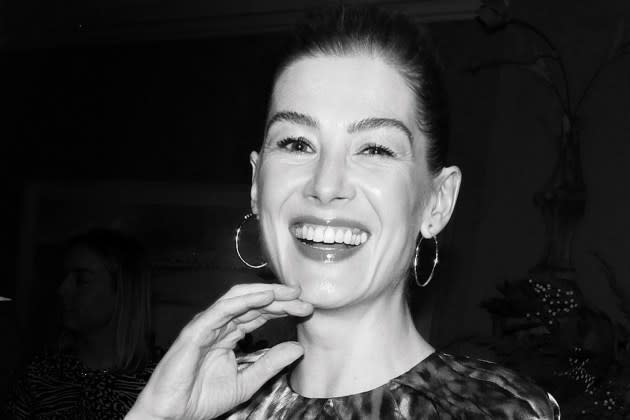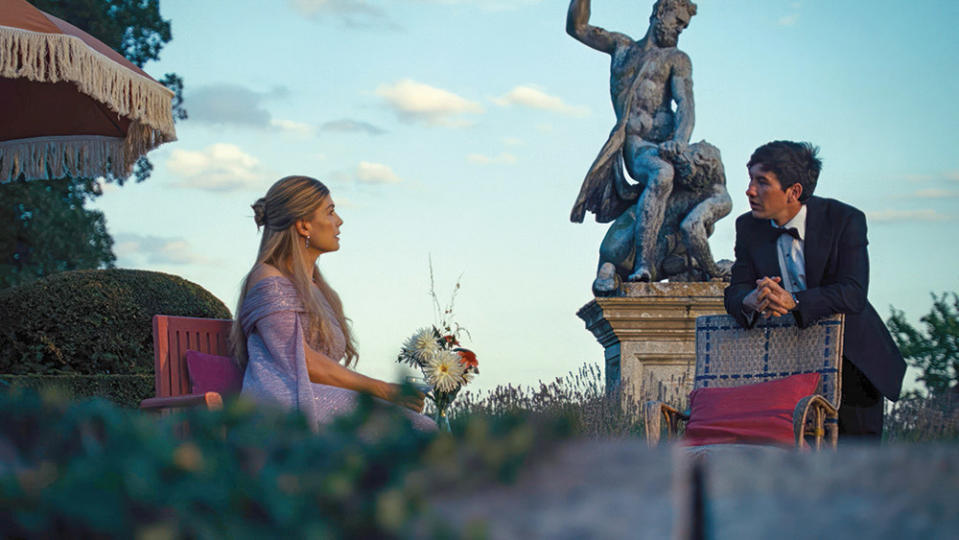How Rosamund Pike Prepared for ‘Saltburn’: 2007 Vogues, New Cocktails and a Vacation
- Oops!Something went wrong.Please try again later.
- Oops!Something went wrong.Please try again later.
- Oops!Something went wrong.Please try again later.
- Oops!Something went wrong.Please try again later.

In Oscar-winning writer-director Emerald Fennell’s twisted thriller Saltburn, Rosamund Pike is the deft comedic counterbalance.
Her character, Elspeth Catton, a wealthy former model and mother to Jacob Elordi’s character Felix, breaks up the drama with head-turning quips often delivered while lounging around the family’s estate. One such example: “I was a lesbian for a while, you know, but it was all a bit too wet for me in the end. Men are so lovely and dry.”
More from The Hollywood Reporter
Feinberg Forecast: First Post-Shortlists Read of the Oscar Race
'Saltburn' Is Now Streaming: Here's How To Watch the Movie Online for Free
Pike’s disarming humor comes amid a storyline that sees Felix inviting his less fortunate Oxford classmate, Oliver Quick (played by Barry Keoghan), to their home for the summer, setting off a cascading series of unfortunate events that befall the family. Pike’s character is a witness to the unraveling, though Elspeth would rather pretend there’s nothing amiss.
When she received the script, Pike says, she was drawn in by the idea that it was an updated Brideshead Revisited — but then found it was much more.
“She’s taking this in her own mad, kind of naughty, erotic direction, and Elspeth just felt like a delightful ingredient in this forbidden whole,” Pike says.
Throughout the filming process, Pike gained a strong sense of Elspeth and her opinions on topics ranging from whether she’d like vegetables — no, they aren’t interesting enough — to whether she’d stay late at Oliver’s Midsummer Night’s Dream bash — yes, which is why we see Pike dancing onscreen in a feathered headdress.
She joined THR for a spoiler-filled conversation about finding her way into a character who only “dips a toe” into reality and how she hopes theatergoers interact with the film.
Was there anything you did to prepare to play Elspeth?
Yeah, loads. I went on vacation, I tried some new cocktails. I ordered some Vogues from 2007 off eBay and basically tried to do as little as possible apart from thinking what I was going to wear and how I’m going to do my hair. (Laughs.) I’ve done so much research for so many characters, including having chemistry lessons when I was playing Marie Curie [in 2019’s Radioactive] that, really, I was like, “What? Oh, there’s really nothing to do. All I’ve got to do is do less.” So that was quite funny.
I heard that you did stay at the estate where they shot Saltburn during the filming process. What was that like?
It’s amazing that you could just be living in the same house as another family and never see them. They’ve got beautiful gardens that I could get lost in and go and read. I mean, I wouldn’t tell Elspeth I was reading a book — I don’t think Elspeth has ever read a book in her life. I think there are not enough pictures. I think she likes magazines. But me, Rosamund, would definitely go into the gardens and lie in the grass and read books.

Did you have a degree of freedom and leeway on set in saying how you thought your character would behave?
Oh, yes. I think Emerald and I saw very eye to eye on who Elspeth was, and anything that she fed into the mix was always welcome and brilliantly specific. And with Elspeth, I just always thought, “How can I drape myself best over all the furniture?” I think she’s someone who’s never going to sit if she can lie and never going to stand if she can sit. She’s just going to be as relaxed as possible in all situations. But Emerald and I had a kind of gleeful time thinking of exactly what Elspeth would be doing. I think Elspeth doesn’t ever have a middle ground. She loves something or she loathes it. She loathes karaoke because she’s sitting there with her fingers in ears through the whole of the karaoke scene, for instance. It’s fun to play a character where you decide that they have extremes and just decide what the extreme is going to be.
You also have some incredible one-liners in the film. Was that all in the script, or were you able to improvise?
There’s a little conversation that Carey Mulligan and I have before Oliver enters the family space for the first time, where we were just kind of riffing in as much of a terribly snobbish fashion as we could muster on what poor waif was about to walk through the door. They salaciously feed on his misfortune, as it’s been described to them. Carey and I had lots of fun being quite ill-educated in terms of how the other half lives.
With those one-liners, your character is often the one providing the humor in a largely dark storyline. What was it like for you playing that role, and did you feel a need to be the humor in these moments?
What I don’t know is: Is she funny because the fact of her is just ridiculous, or are her observations just so outrageous and so indiscreet that we just laugh because we kind of wish we could say things like that? Maybe we all wish we could be as indiscreet as Elspeth. I probably do at times. I did find it very, very freeing. She’s got no filter. And I did want to make people laugh. I did want the rest of the cast to enjoy Elspeth as well.
Do you think that your character has an awareness of reality, and what did that mean for your portrayal?
Reality is too boring, I think, isn’t it? I think she dips a toe in reality every so often and sort of shudders and takes it out pretty quickly. Like, she’s stuck her toe in a frog pond.
She definitely has glimpses of terrible reality. Obviously there’s the tragedy with Felix, which is real and heartfelt and totally devastating. Emerald always said that when we follow Elspeth back through the maze toward the center, she knows it’s going to greet her with this sort of unimagined worst horror. And it had to be Elspeth who would find Felix. Emerald said we will never see her face because a mother’s grief should not and cannot be seen. I did [the scene], and the pain of it was so intense and horrific and awful when we [only] hear it. But then, by the time everybody else arrives, Elspeth’s already shut up, completely siphoned off the real, true feeling because I think she’s just so adept. At the minute she feels something real, she slices through it, she just cuts it. But that’s why she talks about lunch [afterward], because it’s part of the social codes that have gotten the British people through countless traumas throughout history. There’s always a social code that can save you in a moment of desperate agony.
The conundrum of playing Elspeth was she’s so funny and she’s so shallow. And she’s so superficial in many ways. And yet, midway through the film, she suffers this unimaginable grief. And it’s really as real as it would be for anybody. So, I feel that for the latter part of the film, I was having to play her more and more like a ghost.
One of the most shocking scenes, among many, was the moment in the end where your character is in a coma and Oliver rips out her breathing tube. Was that a body double or was that entirely you in the scene?
It was completely me. I was absolutely there for two days of Barry doing what he will. I was trying to be a very active acting partner for him. I was trying to respond with my kind of disturbing breath in a way that he would feel like he had an active participant in that scene. If you’re ever a comatose body in a scene, I think it’s your duty to be there for the other actor.
What do you hope people take away from this film?
I don’t know that I want them to intellectualize it. I want them to have conversations about it. I want them to feel scared and shocked and turned on and be made to laugh and be made to think. I want people to be asking questions or thinking about their own parents or their own families, or just thinking back to 2006 and 2007 and remembering the music they love.
This story first appeared in a December standalone issue of The Hollywood Reporter magazine. Click here to subscribe.
Best of The Hollywood Reporter

